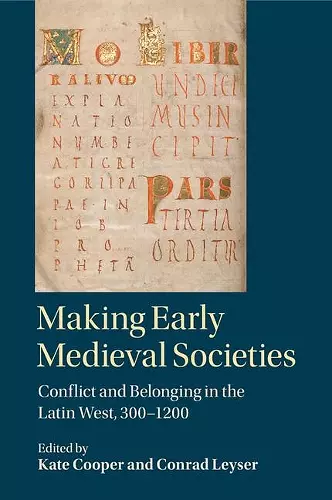Making Early Medieval Societies
Conflict and Belonging in the Latin West, 300–1200
Conrad Leyser editor Kate Cooper editor
Format:Paperback
Publisher:Cambridge University Press
Published:1st Feb '18
Currently unavailable, and unfortunately no date known when it will be back
This paperback is available in another edition too:
- Hardback£61.00(9781107138803)

Examines the fundamental question of what held the societies of the post-Roman world together.
While traditional histories look at the 'Dark Ages' in light of the decline of the Roman state and the rise of early medieval kingdoms, Making Early Medieval Societies considers the period from an anthropological perspective, asking how small- and large-scale processes of dispute settlement and conflict resolution endured and evolved.Making Early Medieval Societies explores a fundamental question: what held the small- and large-scale communities of the late Roman and early medieval West together, at a time when the world seemed to be falling apart? Historians and anthropologists have traditionally asked parallel questions about the rise and fall of empires and how societies create a sense of belonging and social order in the absence of strong governmental institutions. This book draws on classic and more recent anthropologists' work to consider dispute settlement and conflict management during and after the end of the Roman Empire. Contributions range across the internecine rivalries of late Roman bishops, the marital disputes of warrior kings, and the tension between religious leaders and the unruly crowds in western Europe after the first millennium - all considering the mechanisms through which conflict could be harnessed as a force for social stability or an engine for social change.
'In this groundbreaking collection, the social impact of 'constructive feuding' is analysed in terms of how its potential destructive impact in practice was limited by customary rules. Cooper, Leyser and their colleagues have form in challenging accepted understandings of the past through the redrawing of disciplinary boundaries and this exciting volume poses fresh questions with some unexpected answers.' Jill Harries, University of St Andrews
'This valuable collection brings together essays of established and rising scholars who reflect on cohesion and power from late antiquity to the twelfth century. As a whole, these essays accomplish the twin objectives of engaging with recent approaches to the history of power and its representation in the early Middle Ages and at the same time suggesting new ways of understanding power as forms of social and cultural practices rather than in the terms of the long and largely fruitless debate about state vs non-state political orders.' Patrick Geary, Institute for Advanced Study, Princeton
'This is a very valuable book, making a significant contribution to the rich literature on social cohesion and conflict in early medieval Europe. Leading historians take a pleasing variety of approaches both to specific texts and to general questions. The essays will be stimulating reading for all interested in the period and in the engagement of history with anthropology.' John Hudson, University of St Andrews
'Innovative and thought-provoking. … Deftly interweaving disparate methods, time-periods, and regions, the monograph produces a fresh vision of a millennium of Western European history.' Michael E. Stewart, Journal of Social History
'Much important food for thought in this book, which will repay careful reading (and re-reading).' Levi Roach, The English Historical Review
ISBN: 9781316503607
Dimensions: 227mm x 152mm x 16mm
Weight: 440g
293 pages